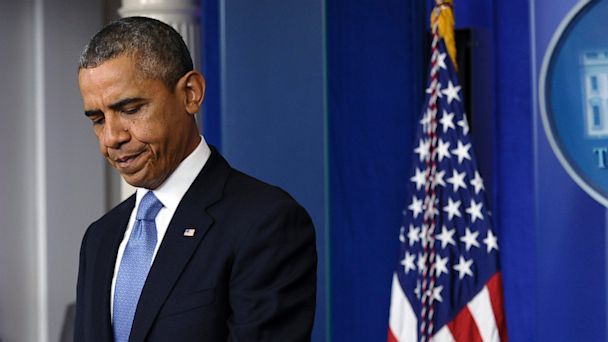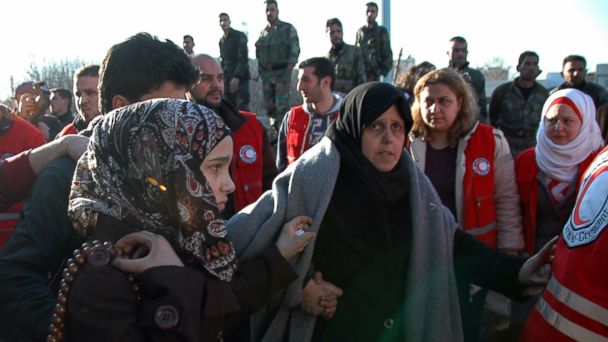Blurred Lines: Six Countries That Totally Ignored Obama's Demands

(Susan Walsh/AP Photo)
It was a complete rebuff issued with blinding speed: Less than 24 hours after President Obama went on national television on Friday to warn Vladimir Putin that "there will be costs for any military intervention," Russia's military seized total control of Crimea.
It's embarrassing for a world power to see its warnings so cavalierly disregarded - and not just when it comes to Russia and Ukraine. During his second term, President Obama has repeatedly found that the sternest warnings and firmest demands from the United States have been ignored with impunity.
Consider these examples:
CHINA and RUSSIA: Snowden Slips ByRHETORIC: The Administration repeatedly warned China (where Snowden first fled) and Russia that Edward Snowden was a fugitive felon who must be turned over to the United States. On June 24, 2013, Secretary of State John Kerry bluntly warned he "would be deeply troubled" if Snowden were permitted to fly from Hong Kong to Russia "and there would be, without any question some effect and impact on the relationship and consequences." After Snowden boarded the plane in Hong Kong, White House Press Secretary Jay Carney added ominously: "This was a deliberate choice by the government to release a fugitive despite a valid arrest warrant, and that decision unquestionably has a negative impact on the U.S.-China relationship."
REACTION: China ignored U.S. demands and allowed Snowden to travel to Russia. Russia ignored demands to turn Snowden over to U.S. authorities and granted him asylum.

The Guardian, Glenn Greenwald and Laura Poitras
RHETORIC: "We have communicated in no uncertain terms with every player in the region that that's a red line for us and that there would be enormous consequences if we start seeing movement on the chemical weapons front or the use of chemical weapons," President Obama said on Aug. 20, 2012.
REACTION: Syria allegedly uses chemical weapons attacks outside Damascus and Aleppo, killing 25 and wounding dozens more.
SYRIA: A 'Game Changer' That Didn't Change The GameRHETORIC: "I have made clear that the use of chemical weapons is a game changer," President Obama said on Mar. 20, 2013.
REACTION: On August 21, 2013, Syria engages in a significantly larger chemical weapons attack in the suburbs of Damascus, killing over a thousand people, including hundreds of children.

SANA/AP Photo
RHETORIC: First, the United States, urged the Egyptian military not to overthrow Egyptian President Mohammed Morsi. On July 3, 2013, Morsi was overthrown. Immediately afterward, President Obama said he was "deeply concerned," adding: "I now call on the Egyptian military to move quickly and responsibly to return full authority back to a democratically elected civilian government as soon as possible through an inclusive and transparent process, and to avoid any arbitrary arrests of President Morsi and his supporters."
REACTION: The arrest of President Morsi and his supporters and a sometimes bloody crackdown on the opposition led President Obama to cancel joint military exercises with Egypt a month later.
AFGHANISTAN: Extending The Exit StrategyRHETORIC: The Administration repeatedly warned that if Afghan President Hamid Karzai did not sign the negotiated Bilateral Security Agreement (BSA), the United States would be forced to proceed with plans to withdraw all American troops from Afghanistan by the end of 2014.
REACTION: Karzai refused to sign by the end-of-year deadline and continues to refuses even as the administration has extended the deadline.
UGANDA: It's ComplicatedRHETORIC: On February 16, 2014 President Obama issued a blunt warning to Uganda's President Yoweri Museveni not to enact a law imposing harsh penalties for homosexual acts. "It will be a step backward for all Ugandans and reflect poorly on Uganda's commitment to protecting the human rights of its people," the president said in a written statement. "As we have conveyed to President Museveni, enacting this legislation will complicate our valued relationship with Uganda."
REACTION: One week later, President Museveni signed the bill into law anyway.

Stephen Wandera/AP Photo